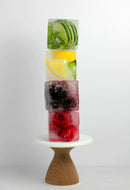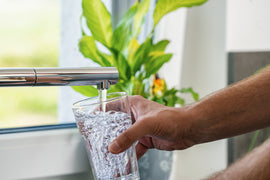The availability of purified water and the ease of which to obtain it has evolved over the years. When comparing alkaline water vs. distilled water, specifically, each are effective water filtering processes, although each follows a different method.
Distilled water occurs by boiling tap water and then collecting the water vapor as it condenses to transform back into water, free of harmful contaminants that are left behind. Alkaline water is water that’s been filtered to increase its pH level, making it less acidic. The process also involves adding minerals to the water rather than removing them. Each has their own advantages with regards to quality and taste.
Diving deeper into the comparison of both will help to reveal why these two water purification methods are so popular today and how businesses can stay competitive by making these options available as a perk or amenity.
Why Choose Alkaline Water?
People like alkaline water because it neutralizes the acidity in the body by increasing the pH level of tap water. Typically speaking, regular drinking water has a pH level of seven; alkaline water normally registers a 8 or 9 on the pH scale of 0-14. It’s sold by the bottle in health food and specialty stores and commercial water ionizers are available to accommodate businesses. On an individual basis, simply adding lemon or lime juices to water can cause water to be alkaline as the body digests it.
Many people who enjoy drinking alkaline water experience health benefits, such as support to the immune system and aid in detoxification. While greater scientific research is needed to verify these claims, staying hydrated does benefit a person’s health. Plus, neutralizing acidity in the body, often caused by environmental impurities and an unbalanced diet, helps to relieve stress from the internal organs that work hard to eliminate a buildup of acid.
Despite its benefits, the main differentiator is the change to the water’s pH level. It’s important to note that alkaline or ionized water does not automatically mean it’s purified. It depends on where it’s sourced. This may be a key factor when considering investing in alkaline water vs. distilled water. Although some may appreciate the option, the majority may still prefer water that’s been purified instead.
Why Choose Distilled Water?
The water distillation process achieves what ionizing water does not. By collecting water vapor through its heating method, it leaves behind harmful contaminants, such as bacteria, viruses, and chemicals, including chromium, lead, and arsenic. Unfortunately, it also removes valuable minerals from the water as well, many of which are beneficial to your body. Because of this, the taste of distilled water is often described as “flat,” which leaves something to be desired for anyone who wants to increase their daily water intake.
Having the option of distilled water available is a perk for those who want to avoid drinking caffeine and sugary drinks throughout the day. Many who prefer distilled water believe that its purity is good for cleansing the body and reducing consumption of harmful chemicals. While the process does remove contaminants from tap water, it doesn’t return any of the essential minerals that are stripped out.
Generally speaking, drinking distilled water is less common. It’s primarily reserved for household uses, such as watering plants and using for steam irons. However, if your city is known to have a high area of contaminants in the water, it’s likely safer to drink distilled than from the tap.
Lastly, water distillation systems vary in cost depending on the amount of water that’s needed. Installing one increases the amount of electricity required, which is another factor to consider when choosing which water treatment method that’ll work best for your needs.
The Advantage of Offering Sustainable, Purified Water Options
Not all cities have the same quality of tap water. Some systems are even deemed non-potable, leaving many without access to clean and pure water for drinking or cooking. When not drinking from the tap, the easy solution for decades has been to rely on bottled water instead. This option is costly to the environment and is not a sustainable solution for large organizations. Replenishing a bottled water supply can become expensive, difficult to coordinate, and lead to an undesirable experience for all.
In today’s world, with the continuing increase of plastic waste, people are conscientious about their carbon footprint and want alternatives that don’t contribute to environmental pollution. Furthermore, with certain areas banning the use of single-use plastic bottles, it has caused industries to look for alternatives to keep the demand for clean water on-the-go available.
For example, many organizations have updated their initiatives over the years to provide a sustainable solution when offering purified water. Hotels, airports, and schools have moved away from using single-use plastic bottles and have installed water refill stations instead. These are eco-friendly and can better support a high demand.
In addition to environmental responsibility, replenishing water bottles or jugs on a regular basis for hundreds, if not thousands, of people is costly. A water purification system that can meet the needs of many without constant monitoring or maintenance required is an operationally effective choice.
The introduction of alkaline water, distilled water, and other purified water choices encourages people to stay hydrated. Having options are what many come to expect in places of business and public spaces. Whether it’s from a convenience, cost, taste, or environmental standpoint, every person has their own order of priorities.
From there, it’s about offering access to the best-tasting pure water available. When this is included as an amenity for guests, travelers, or employees, it gives people an extra incentive or reason to favor a certain company or brand. Tuning into changing preferences is what helps keep businesses competitive.
Choosing the Best of Both Worlds with FloWater
The only thing people like more than options is the ability to have “all of the above.” There are benefits from drinking both alkaline and distilled water, but each has its drawbacks as well. The advantage of having a FloWater Refill Station is that it meets the best of both worlds. With the FloWater process, tap water is transformed through seven, unique filters, all of which remove impurities or enhance the water for an enjoyable drinking experience.
How the Purification Process Works
The purification process starts with three separate filters designed to remove varying levels of pollutants. The first water filter eliminates sediment, dust, and suspended solids often found in tap water or leached from the pipes and makes its way to the tap. Updating a city’s entire water system takes time, money, and planning, which often gets delayed or ruled out in favor of other initiatives. Therefore, old lead pipes and contaminated areas can easily infiltrate the water system, leaving its residents with non-potable water.
The second step is the carbon filter which removes smaller particles, such as hydrogen sulfide and chlorine. These often leave behind the unpleasant taste and odor that many associate with tap water. Then, the process moves into the third filter of advanced osmosis. Advanced osmosis uses a semi-permeable membrane to filter the smallest contaminants, like bacteria, viruses, and pesticides, and any other traces of chemicals left behind from the previous two filters.
Unlike standard reverse osmosis water systems, FloWater adds back important minerals and electrolytes and elements that are stripped away. The next three filters include: activated oxygen, alkaline enhancement, and a boost of natural electrolytes. Each water filter is important to improve the quality, pH level to regulate acidity, and taste of the water.
To learn more about reverse osmosis vs. distilled water treatments, visit here.
Many people opt for sports drinks to get electrolytes like magnesium and potassium, but often have to compromise calories and artificial flavorings as a result. With FloWater, these electrolytes, plus sodium and calcium are added, making it extra beneficial to stay hydrated and energized, which makes it a good addition to gyms, schools, and workplaces.
The final flourish is the coconut carbon filter that adds the distinctive, crisp, fresh finish. People want purified water, but they also want it to be refreshing. Alkaline water doesn’t necessarily involve purification and distilled water doesn’t always taste great. FloWater achieves both and more.
Design Benefits of the Refill Station
The FloWater Refill Station dispenses water at a cool 42 degrees, the optimal drinking temperature. Certain models also provide hot water options as well. Additionally, the touchless water dispenser can serve a high capacity of people with a rapid fill time and fast auto-replenishment to avoid lines forming. The dispensing area fits any refillable container size which means fewer trips are necessary to stay hydrated for the convenience of all.
The one-touch fill button allows each person to dispense water in under 10 seconds to minimize contact. This is all advantageous for businesses adjusting and continuously improving their sanitation protocols and amenity offerings. Like anything else, the kind of water people like to drink comes down to personal preference, but it’s safe to say the majority want clean, convenient, great-tasting water at their disposal, which is what FloWater offers. It combines the best of alkaline water and distilled and encourages everyone to stay hydrated and healthy.
Sources:
- https://www.cdc.gov/healthywater/drinking/home-water treatment/household_water_treatment.html
- https://www.healthline.com/health/food-nutrition/alkaline-water-benefits-risks
- https://www.healthline.com/health/can-you-drink-distilled-water
- https://www.medicalnewstoday.com/articles/317698#What-are-the-potential-benefits-of-drinking-distilled-water






